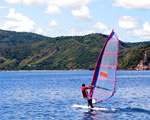 Go to main content
Go to main content
Archive Website of the UK government
Please note that this website has a UK government accesskeys system.
Main menu
Page menu
Travel and transport

Water sports and coastal activities - safety advice

Beaches and coastlines are great places to enjoy water sports. Whichever activity you're taking part in, take responsibility for your safety by making sure you're properly trained and prepared for the conditions. Follow these safety tips and find out where to get the right training.
General safety in or on the water
 If you see someone in difficulty
If you see someone in difficulty
Don't attempt a rescue - tell a lifeguard, or dial 999/112 and ask for the coastguard
All sports have their own rules but there are some general safety tips that apply to all water activities:
- get trained - take part in any safety training needed for your sport or activity
- check the weather and tides before setting out
- wear a lifejacket - make sure it's the right one for the activity
- keep in touch - take an appropriate means of communication with you, like a marine band radio or mobile phone
- tell someone where you're going and when you'll be back
- don't drink alcohol before going in or on the water
Make sure you understand and obey any safety flags at the beach and pay attention to the lifeguard, if there's one on duty.
Get the right training for your water activity
You'll need to take different safety precautions depending on which activity you're taking part in. You can get specialist advice about the training and safety gear you'll need for each activity from a professional or governing body. You might also consider joining a local club for qualified support and advice.
Angling and fishing
Although there are no safety regulations for recreational angling, it's a good idea to have membership in an organisation like the Angling Trust. Contact the Angling Trust for more details on local clubs.
Canoeing and kayaking
If you are new to canoeing and kayaking, you should join a club or get training from an approved centre. Check the British Canoe Union website for clubs and centres near you.
If you use your canoe or kayak on inland waterways, you'll need a navigational licence. See 'Using your boat on inland waterways' for more information.
Cliff climbing
It's important to have training for cliff climbing so you understand climbing techniques and how to use the right gear and safety equipment. For advice about safety, training and where to climb, contact the British Mountaineering Council.
Kite surfing
Kite surfing is an extreme sport where a kite pulls you through the water on a small surfboard.
Don't try to kite surf without proper instruction. You can get lessons at an approved school, like one run by the British Kite Surfing Association (BKSA).
Personal watercraft
A personal water craft (PWC) is a water vehicle that the rider sits or stands on. They are commonly known by brand names, like Jet Ski, Wave Runner or Sea Doo. Riding a PWC can be a risky activity if you are inexperienced or unprepared. It's a good idea to become a member of a PWC club or organisation, as they organise training days.
The Royal Yachting Association and the Personal Watercraft Partnership can give you more advice on safety, training and where to launch. The Royal National Lifeboat Institution (RNLI) also has a good guide on using a PWC safely.
Sailing
The national governing body for sailing is the Royal Yachting Association (RYA). Check the RYA website for information about training. Follow the links below for more information about training and safety on board yachts and other pleasure craft.
Scuba diving
All beginner divers are recommended to enrol in a recognised training course that will lead to a scuba diving certificate.
The four main agencies that offer training are:
- the British Sub-Aqua Club (BSAC)
- the Professional Association of Diving Instructors (PADI)
- the Sub-Aqua Association (SAA)
- the Scottish Sub-Aqua Club (SSAC)
Surfing
The British Surfing Association (BSA) has a list of approved surfing schools in your area.
Water safety and life-saving training
For training in water safety and life saving, contact the Royal Life Saving Society.
Join HM Coastguard's voluntary safety identification scheme
You can register your pleasure craft or leisure vessel, like a canoe or PWC, with the coastguard through the voluntary safety identification scheme (CG66). This means that if you get into difficulty, the coastguard has information about your vessel that will help to identify you. Follow the link below for more information.
 Facebook
Facebook Twitter
Twitter StumbleUpon
StumbleUpon Delicious
Delicious Reddit
Reddit